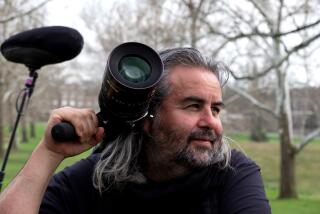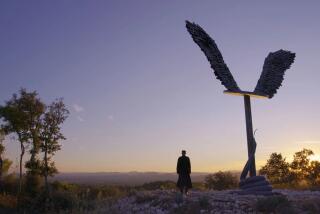In ‘Bonhoeffer,’ a moving testament to a theologian’s faith
- Share via
Just two days after Adolf Hitler became chancellor of Germany on Jan. 30, 1933, a German theologian, Dietrich Bonhoeffer, spoke out against Nazism, marking the beginning of a heroic odyssey that is illuminated with admirable clarity in Martin Doblmeier’s outstanding documentary “Bonhoeffer.”
Along with an astute use of archival materials, Doblmeier takes pains to provide a succinct context for Bonhoeffer’s life and times through the revealing observations of the theologian’s friends, colleagues and relatives. He was born into a large, wealthy, conservative but open-minded and not particularly religious Protestant family in Breslau in 1906. The death of his older brother Walter in World War I proved decisive in his turning to religion.
Doblmeier’s interviewees make clear that since church leaders had supported World War I wholeheartedly, many Germans became disenchanted with religion at war’s end. Bonhoeffer therefore early on was concerned with religion’s role in society -- how the church serves not only the individual but also the community. He ultimately insisted on the importance of responding actively to Christ’s Sermon on the Mount, thus sounding a call for justice that would subsequently serve as an inspiration to the Rev. Martin Luther King Jr. and Archbishop Desmond Tutu, a participant in the film.
In 1930 Bonhoeffer spent a postgraduate year at Union Theological Seminary in New York. There he was influenced by the emotional response on the part of the congregation to the sermons and hymns at Adam Clayton Powell Sr.’s Abyssinian Baptist Church. This and many other experiences would lead Bonhoeffer to become a pioneering leader in the ecumenical movement.
Back in Germany, Bonhoeffer became committed to an all-out effort to orchestrate a unified response by Germany’s religious community to Nazism and its rapidly escalating anti-Semitism. He and his colleagues won over to their cause only a small portion of the Protestant population, while the Vatican struck a deal with the Nazis that allowed it control of Germany’s Roman Catholic churches in return for staying out of German politics. By 1938 Bonhoeffer would become actively involved in the resistance movement along with four of his relatives.
For all his formidable intellect, Bonhoeffer is remembered by those who knew him as a warm, caring and unpretentious man. Of his many observations recounted in this thought-provoking film, the most significant may be his assertion that faith is only possible when one lives life completely.
*
‘Bonhoeffer’
MPAA rating: Unrated
Times guidelines: Somber, complex material
A First Run Features release of a South Carolina ETV presentation of a Journey Films production. Writer-producer-executive producer-director Martin Doblmeier. Cinematographers Dennis Boni, Dave Goulding, Jorg Plica, Peter V. Schultz. Editors Tim Finkbiner, Matthew B. Kelly. Music John D. Keltonic. Running time: 1 hour, 30 minutes.
Exclusively at the Music Hall, 9036 Wilshire Blvd., Beverly Hills, (310) 274-6869; and the Fallbrook 7, 6731 Fallbrook Ave., West Hills, (818) 340-8710.
More to Read
Only good movies
Get the Indie Focus newsletter, Mark Olsen's weekly guide to the world of cinema.
You may occasionally receive promotional content from the Los Angeles Times.









